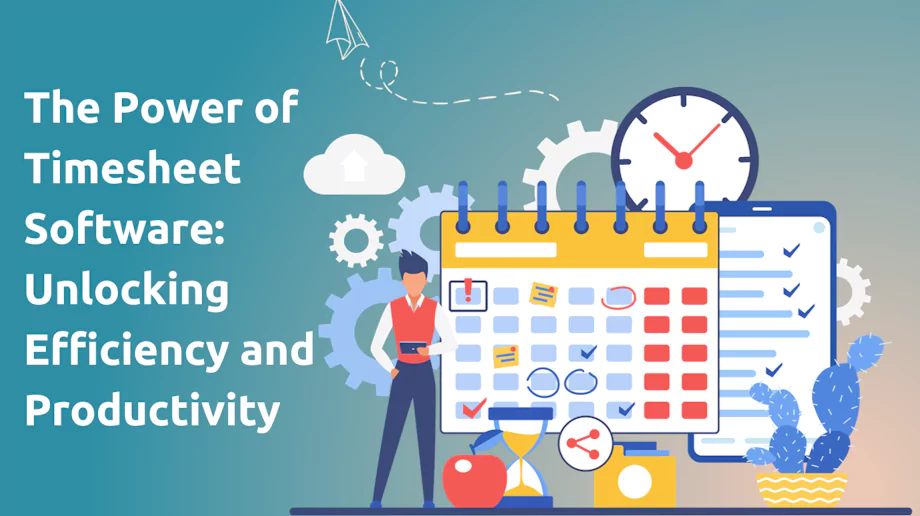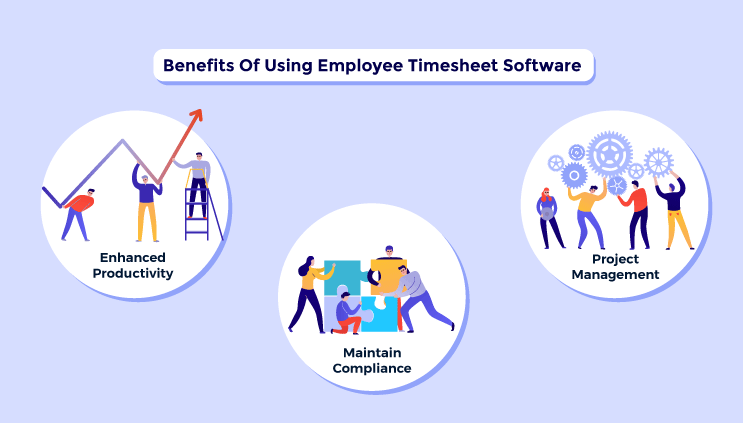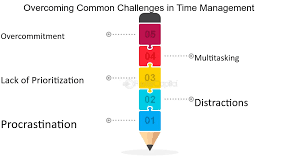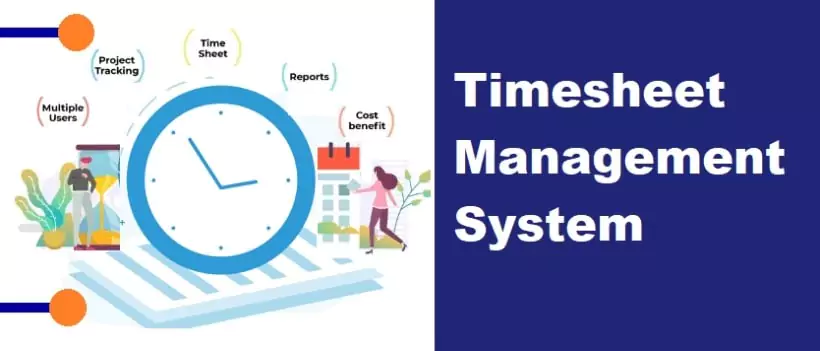Timesheet Management Software: The Key to Productivity and Efficiency

In a world where effective workforce management is essential for business success, timesheet management plays a pivotal role in optimizing productivity and efficiency. By accurately tracking and analyzing employee work hours, businesses can gain valuable insights into time allocation, project progress and resource utilization. In this comprehensive blog post, we will explore the significance of timesheet management, its benefits and how businesses can leverage technology to enhance workforce productivity and performance.
Why Timesheet Management Software is Important for Businesses

Timesheet management involves tracking employee work hours and activities to monitor productivity and allocate resources effectively. An efficient timesheet management system can:
 Improve
Productivity: Monitoring employee time helps identify patterns and opportunities
for improvement, leading to increased productivity.
Improve
Productivity: Monitoring employee time helps identify patterns and opportunities
for improvement, leading to increased productivity.
-
 Enhance Project
Management: Timesheets provide insights into project progress, resource
allocation and potential delays, enabling better project planning and execution.
Enhance Project
Management: Timesheets provide insights into project progress, resource
allocation and potential delays, enabling better project planning and execution.
 Ensure
Compliance: Proper timesheet management aids in compliance with labor laws,
industry regulations and company policies regarding work hours and overtime.
Ensure
Compliance: Proper timesheet management aids in compliance with labor laws,
industry regulations and company policies regarding work hours and overtime.
 Optimize Resource
Allocation: Accurate timesheet data allows businesses to allocate resources
effectively and plan for future needs.
Optimize Resource
Allocation: Accurate timesheet data allows businesses to allocate resources
effectively and plan for future needs. Streamline
Payroll Processing: Timesheets provide precise data for payroll calculations,
reducing errors and ensuring accurate compensation.
Streamline
Payroll Processing: Timesheets provide precise data for payroll calculations,
reducing errors and ensuring accurate compensation.
Key Benefits of Effective Timesheet Management

A well-implemented timesheet management system offers numerous advantages to businesses:
 Enhanced
Productivity and Accountability: Tracking work hours and tasks helps employees
stay focused and accountable for their time, resulting in increased productivity.
Enhanced
Productivity and Accountability: Tracking work hours and tasks helps employees
stay focused and accountable for their time, resulting in increased productivity. Data-Driven
Insights: Analyzing timesheet data can reveal trends and patterns that inform
strategic decision-making and workforce planning.
Data-Driven
Insights: Analyzing timesheet data can reveal trends and patterns that inform
strategic decision-making and workforce planning. Improved Project
Planning and Execution: Timesheet data provides valuable insights into project
progress and resource utilization, aiding in better planning and execution.
Improved Project
Planning and Execution: Timesheet data provides valuable insights into project
progress and resource utilization, aiding in better planning and execution. Accurate Payroll
and Billing: Precise timesheet data ensures accurate payroll processing and
billing for client projects.
Accurate Payroll
and Billing: Precise timesheet data ensures accurate payroll processing and
billing for client projects. Compliance
Support: Proper timesheet management helps businesses comply with labor laws and
industry regulations regarding work hours and overtime.
Compliance
Support: Proper timesheet management helps businesses comply with labor laws and
industry regulations regarding work hours and overtime.
Overcoming Challenges in Timesheet Management

While timesheet management offers significant benefits, there are challenges businesses must address to achieve success:
 Employee
Resistance: Employees may resist timesheet tracking if they perceive it as
micromanagement or a lack of trust. Clear communication and education can help alleviate
these concerns.
Employee
Resistance: Employees may resist timesheet tracking if they perceive it as
micromanagement or a lack of trust. Clear communication and education can help alleviate
these concerns. Data
Accuracy: Ensuring accurate timesheet data is crucial for effective workforce
management. Implementing automated tracking solutions can help minimize errors.
Data
Accuracy: Ensuring accurate timesheet data is crucial for effective workforce
management. Implementing automated tracking solutions can help minimize errors. Time-Consuming
Processes: Manual timesheet management can be time-consuming and prone to
errors. Digital solutions can streamline the process and save time.
Time-Consuming
Processes: Manual timesheet management can be time-consuming and prone to
errors. Digital solutions can streamline the process and save time. Integration with
Other Systems: Timesheet management should integrate seamlessly with payroll and
project management systems to ensure smooth operations and data accuracy.
Integration with
Other Systems: Timesheet management should integrate seamlessly with payroll and
project management systems to ensure smooth operations and data accuracy.
Leveraging Technology for Optimal Timesheet Management

Modern technology offers innovative solutions for effective timesheet management that can greatly enhance workforce productivity and efficiency:
 Digital Timesheet
Tools: Utilize digital tools and apps for easy and accurate timesheet tracking,
reducing the risk of errors and saving time.
Digital Timesheet
Tools: Utilize digital tools and apps for easy and accurate timesheet tracking,
reducing the risk of errors and saving time. Automated
Tracking: Implement automated tracking solutions to capture work hours and tasks
without disrupting employee workflows.
Automated
Tracking: Implement automated tracking solutions to capture work hours and tasks
without disrupting employee workflows. Real-Time Data
Access: Access real-time timesheet data for timely insights and decision-making,
allowing for immediate adjustments as needed.
Real-Time Data
Access: Access real-time timesheet data for timely insights and decision-making,
allowing for immediate adjustments as needed. Integration with
Payroll and Project Management: Ensure your timesheet system integrates with
payroll and project management tools for seamless data flow and improved operational
efficiency.
Integration with
Payroll and Project Management: Ensure your timesheet system integrates with
payroll and project management tools for seamless data flow and improved operational
efficiency. Customizable
Reporting: Generate customizable reports for detailed analysis and strategic
insights into workforce and project performance.
Customizable
Reporting: Generate customizable reports for detailed analysis and strategic
insights into workforce and project performance.
Best Practices for Timesheet Management

To maximize the benefits of timesheet management, businesses should consider implementing the following best practices:
 Clear Policies
and Guidelines: Establish clear policies for timesheet tracking and communicate
them effectively to employees.
Clear Policies
and Guidelines: Establish clear policies for timesheet tracking and communicate
them effectively to employees. Provide Training
and Support: Offer training and support to help employees understand the
importance of timesheet tracking and how to use the tools effectively.
Provide Training
and Support: Offer training and support to help employees understand the
importance of timesheet tracking and how to use the tools effectively. Regular
Audits: Conduct regular audits of timesheet data to ensure accuracy and
compliance with company policies and regulations.
Regular
Audits: Conduct regular audits of timesheet data to ensure accuracy and
compliance with company policies and regulations. Feedback and
Adjustments: Gather employee feedback on timesheet management processes and make
adjustments as needed for continuous improvement.
Feedback and
Adjustments: Gather employee feedback on timesheet management processes and make
adjustments as needed for continuous improvement.
Conclusion

Effective timesheet management is a powerful tool for maximizing productivity and efficiency in the workplace. By leveraging technology and implementing best practices, businesses can gain valuable insights into workforce performance and project progress, optimize resource allocation and ensure accurate payroll and billing. As companies continue to evolve and face new challenges, mastering timesheet management will be key to sustained success.